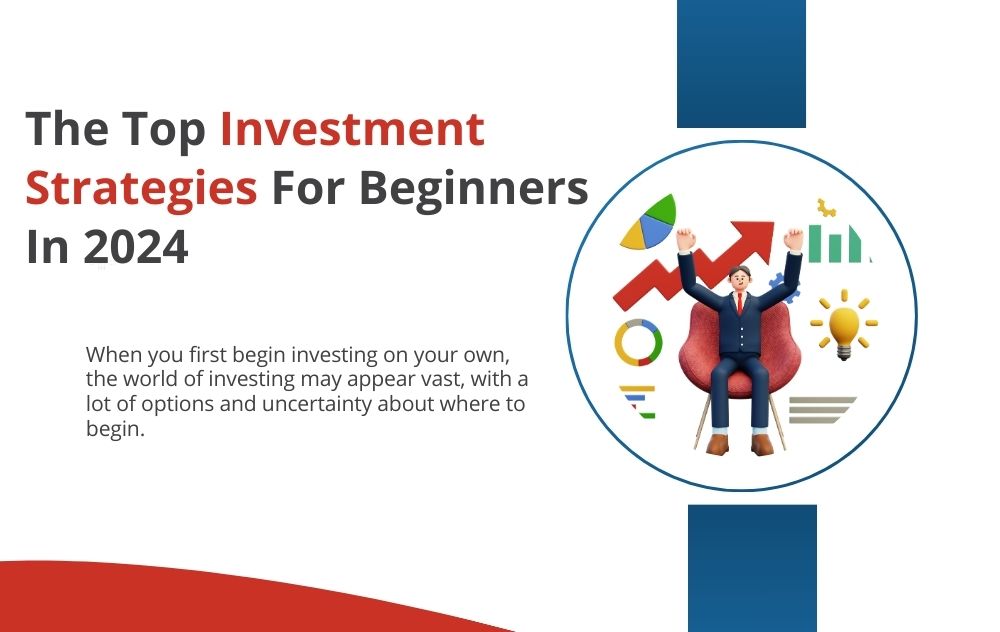The Top Investment Strategies For Beginners In 2024
When you first begin investing on your own, the world of investing may appear vast, with a lot of options and uncertainty about where to begin. What if you regret a poor decision you made? Well, you wouldn’t be alone. Jeff Fratarcangeli, an expert in wealth management, emphasizes that a good investment strategy takes time to work and should not be considered a “get rich quick” scheme. So it’s important to begin investing with realistic expectations of what you can and can’t achieve. This guide will walk you through simple, actionable strategies to help you get started with confidence and make smart decisions for your financial future.
1. Buy and hold
The buy-and-hold strategy is a time-tested approach where you purchase an investment and hold onto it for the long term, usually for at least three to five years. The goal is to avoid selling and instead focus on the potential growth of the investment over time.
Advantages:
The focus on the long term is what makes buy-and-hold investing so appealing. Unlike many traders, you do not have to worry about daily market fluctuations or attempt to time the market. You are investing in the success of the company itself when you think like an owner. If you hold onto high-performing assets, this strategy can potentially yield substantial returns—up to hundreds of times your initial investment.
Risks:
The key challenge is resisting the urge to sell during tough market times. The market can drop sharply, and individual stocks can lose value, sometimes by 50% or more. Patience and long-term focus are essential to make this strategy work.
2. Buy Index Funds
Index fund investing is a straightforward and successful approach for novices. Index funds are designed to track the performance of a broad market index, like the S&P 500, which includes stocks from many large companies. By buying an index fund, you’re essentially investing in a wide range of companies at once, offering built-in diversification.
Advantages:
One of the main advantages of index funds, as highlighted by Jeff Fratarcangeli, is their ability to diversify your investments. Instead of putting all your money into one stock, you spread it across many companies, which helps reduce risk. Additionally, index funds tend to have lower fees compared to actively managed funds, meaning more of your money is working for you. Over time, index funds often deliver consistent returns that match the overall market, making them a reliable choice for long-term growth. They’re also very easy to manage, as you don’t need to pick individual stocks or watch the market constantly.
Risks:
There are some dangers, though. Index funds are vulnerable to market volatility because they follow the market. The value of your index fund will probably decrease if the market declines. Also, because index funds follow a set index, you don’t have control over the individual stocks within the fund. Despite these risks, index funds are an excellent choice for beginners seeking steady, long-term growth.
3. Index and a few
The “index and a few” strategy combines the benefits of index funds with a small amount of individual stock investments. For example, you might put 94% of your money into index funds, which track a broad market, and then invest 3% in individual companies like Apple or Amazon if you believe they have strong growth potential. This approach allows beginners to stick with a mostly low-risk index strategy while also adding a bit of personal touch by investing in stocks they believe in.
Advantages:
The main advantage of this strategy is that it gives you the stability of index funds, while allowing you to experiment with individual stocks. It’s a good way to start learning about stock analysis without risking too much money. If your individual stock picks don’t perform well, they won’t drastically affect your overall portfolio.
Risks:
The risks are similar to investing in index funds, as long as the individual stocks make up only a small portion of your portfolio. However, if you invest heavily in a few individual stocks, you could see more dramatic changes in your portfolio’s value. It’s important to put in the time to research and understand these individual stocks before investing. Without that knowledge, your portfolio might suffer.
4. Income investing
Investments that generate consistent income, typically in the form of dividends or interest, are the focus of income investing. This approach is well-liked by those who want to generate a consistent flow of income instead of depending on the appreciation of their investments. Common income investments include dividend-paying stocks, bonds, and real estate investment trusts (REITs).
Advantages:
For people looking for stability and consistency, income investing is a fantastic option. By selecting investments that consistently generate interest or dividends, you can establish a passive income source. This can be particularly helpful in retirement or for supplementing other sources of income. Additionally, many dividend-paying stocks tend to be from established companies with a strong track record, which can lower the risk compared to more speculative investments.
Risks:
While income investing offers stability, it’s not without risks. For instance, companies may cut or eliminate dividends if their profits decline, which can lead to unexpected income losses. Bond prices can also fluctuate, affecting the income you receive from interest. Moreover, real estate markets can be unpredictable, which could impact the performance of REITs. It’s important to diversify across different income-generating assets to reduce the impact of these risks.
Wind Up:
Investing is a powerful way to build wealth, but it’s important to approach it with patience and a long-term mindset. Whether you choose a buy-and-hold strategy, invest in index funds, explore a mix of individual stocks, or focus on income-generating assets, each approach offers unique benefits and risks. Start small, stay informed, and remember that successful investing is a journey. With the right strategies, you can make smart choices that support your financial goals for the future. Jeff Fratarcangeli’s wealth management expertise can guide you in making these informed decisions, ensuring a solid foundation for your financial future.













Post Comment